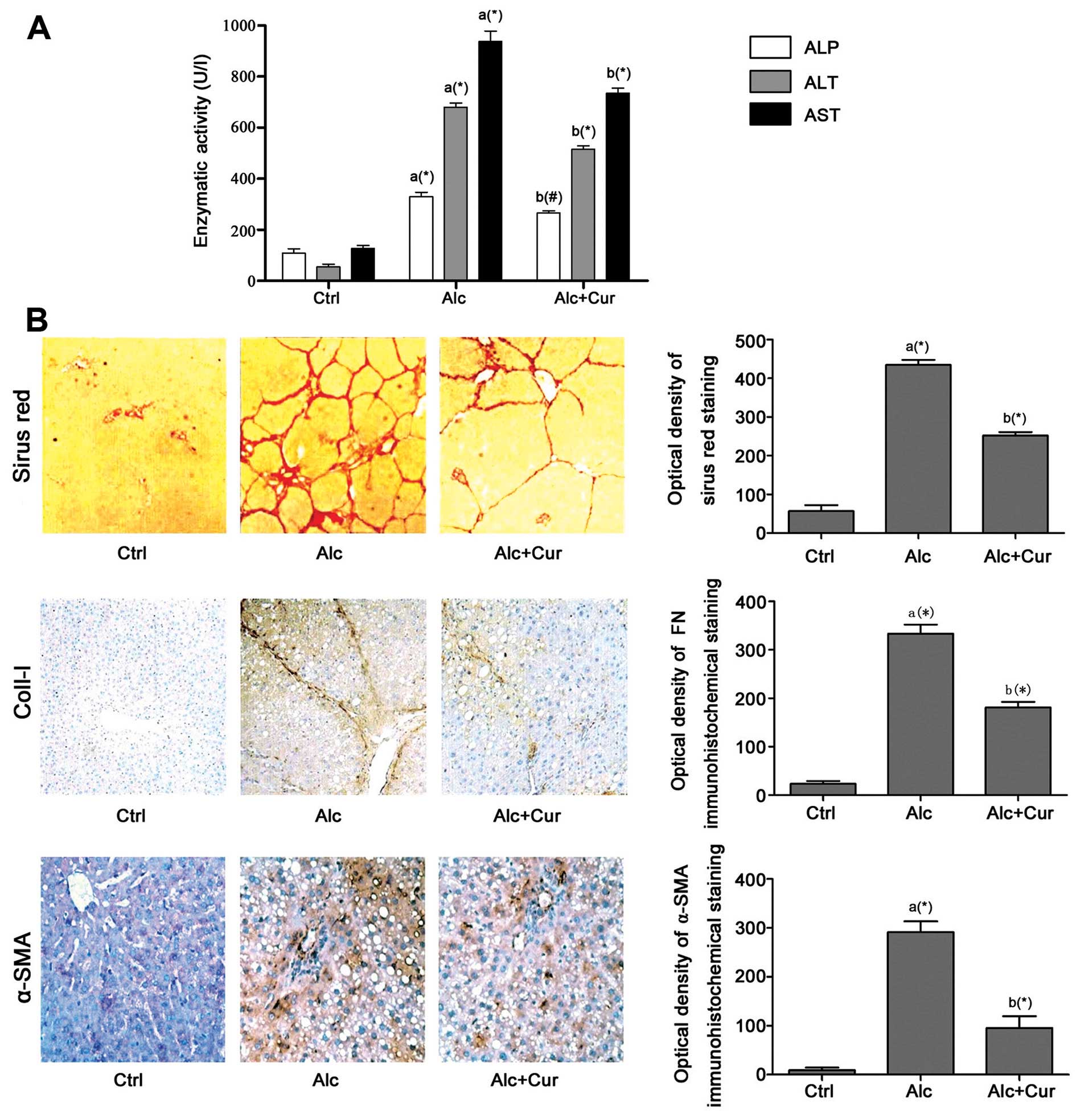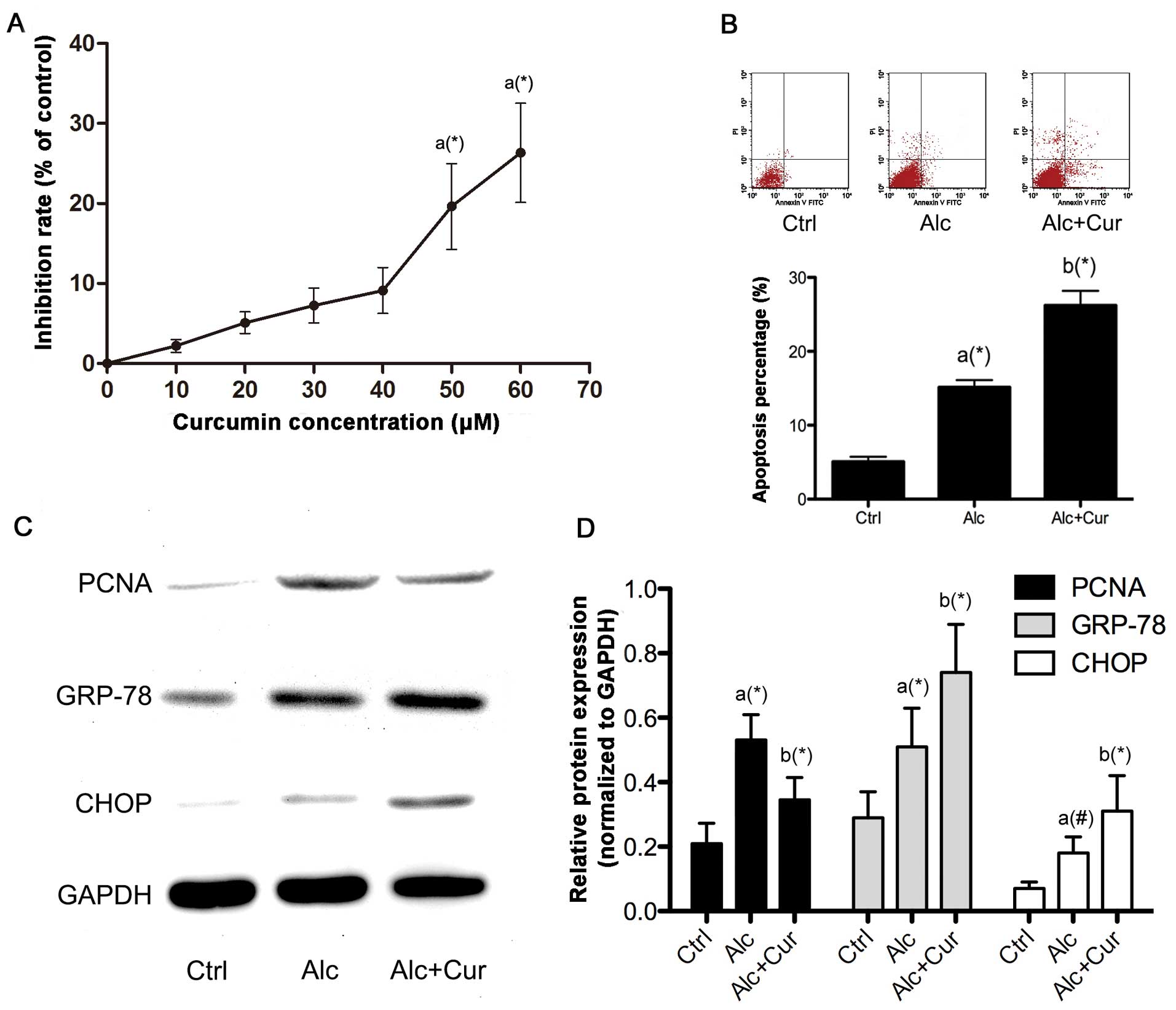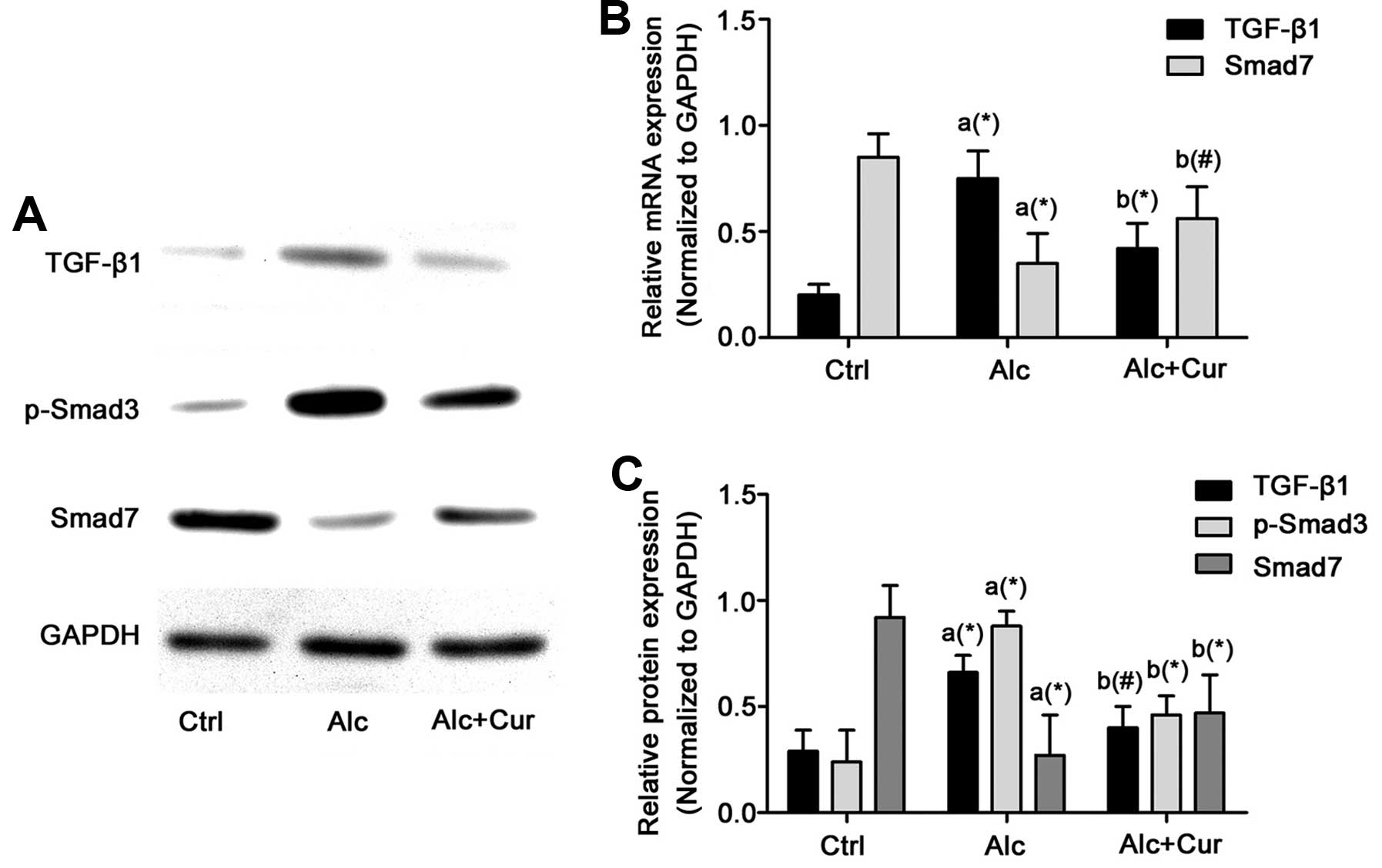|
1
|
Williams R: Global challenges in liver
disease. Hepatology. 44:521–526. 2006. View Article : Google Scholar : PubMed/NCBI
|
|
2
|
Mandayam S, Jamal MM and Morgan TR:
Epidemiology of alcoholic liver disease. Semin Liver Dis.
24:217–232. 2004. View Article : Google Scholar : PubMed/NCBI
|
|
3
|
Poli G: Pathogenesis of liver fibrosis:
role of oxidative stress. Mol Aspects Med. 21:49–98. 2000.
View Article : Google Scholar
|
|
4
|
Brenner DA: Molecular pathogenesis of
liver fibrosis. Trans Am Clin Climatol Assoc. 120:361–368.
2009.PubMed/NCBI
|
|
5
|
Senoo H: Structure and function of hepatic
stellate cells. Med Electron Microsc. 37:3–15. 2004. View Article : Google Scholar
|
|
6
|
Gao B and Bataller R: Alcoholic liver
disease: pathogenesis and new therapeutic targets.
Gastroenterology. 141:1572–1585. 2011. View Article : Google Scholar : PubMed/NCBI
|
|
7
|
Siegmund SV, Dooley S and Brenner DA:
Molecular mechanisms of alcohol-induced hepatic fibrosis. Dig Dis.
23:264–274. 2005. View Article : Google Scholar : PubMed/NCBI
|
|
8
|
Dooley S, Streckert M, Delvoux B and
Gressner AM: Expression of Smads during in vitro
transdifferentiation of hepatic stellate cells to myofibroblasts.
Biochem Biophys Res Commun. 283:554–562. 2001. View Article : Google Scholar : PubMed/NCBI
|
|
9
|
Derynck R and Zhang YE: Smad-dependent and
Smad-independent pathways in TGF-beta family signalling. Nature.
425:577–584. 2003. View Article : Google Scholar : PubMed/NCBI
|
|
10
|
Shi Y and Massague J: Mechanisms of
TGF-beta signaling from cell membrane to the nucleus. Cell.
113:685–700. 2003. View Article : Google Scholar : PubMed/NCBI
|
|
11
|
Kavsak P, Rasmussen RK, Causing CG, et al:
Smad7 binds to Smurf2 to form an E3 ubiquitin ligase that targets
the TGF beta receptor for degradation. Mol Cell. 6:1365–1375. 2000.
View Article : Google Scholar : PubMed/NCBI
|
|
12
|
Chen K, Zhang S, Ji Y, et al: Baicalein
inhibits the invasion and metastatic capabilities of hepatocellular
carcinoma cells via down-regulation of the ERK pathway. PLoS One.
8:e729272013. View Article : Google Scholar : PubMed/NCBI
|
|
13
|
Wu L, Cai B, Zheng S, Liu X, Cai H and Li
H: Effect of emodin on endoplasmic reticulum stress in rats with
severe acute pancreatitis. Inflammation. 36:1020–1029. 2013.
View Article : Google Scholar : PubMed/NCBI
|
|
14
|
Geng J, Peng W, Huang Y, Fan H and Li S:
Ginsenoside-Rg1 from Panax notoginseng prevents hepatic fibrosis
induced by thioacetamide in rats. Eur J Pharmacol. 634:162–169.
2010. View Article : Google Scholar : PubMed/NCBI
|
|
15
|
O’Connell MA and Rushworth SA: Curcumin:
potential for hepatic fibrosis therapy? Br J Pharmacol.
153:403–405. 2008.
|
|
16
|
Noorafshan A and Ashkani-Esfahani S: A
review of therapeutic effects of curcumin. Curr Pharm Des.
19:2032–2046. 2013.PubMed/NCBI
|
|
17
|
Tu CT, Yao QY, Xu BL, Wang JY, Zhou CH and
Zhang SC: Protective effects of curcumin against hepatic fibrosis
induced by carbon tetrachloride: modulation of high-mobility group
box 1, Toll-like receptor 4 and 2 expression. Food Chem Toxicol.
50:3343–3351. 2012. View Article : Google Scholar : PubMed/NCBI
|
|
18
|
Yao QY, Xu BL, Wang JY, Liu HC, Zhang SC
and Tu CT: Inhibition by curcumin of multiple sites of the
transforming growth factor-beta1 signalling pathway ameliorates the
progression of liver fibrosis induced by carbon tetrachloride in
rats. BMC Complement Altern Med. 12:1562012. View Article : Google Scholar : PubMed/NCBI
|
|
19
|
Kim JM, Kim HG, Han JM, et al: The herbal
formula CGX ameliorates the expression of vascular endothelial
growth factor in alcoholic liver fibrosis. J Ethnopharmacol.
150:892–900. 2013. View Article : Google Scholar : PubMed/NCBI
|
|
20
|
Bruck R, Ashkenazi M, Weiss S, et al:
Prevention of liver cirrhosis in rats by curcumin. Liver Int.
27:373–383. 2007. View Article : Google Scholar : PubMed/NCBI
|
|
21
|
Wang Y, Cheng M, Zhang B, Nie F and Jiang
H: Dietary supplementation of blueberry juice enhances hepatic
expression of metallothionein and attenuates liver fibrosis in
rats. PLoS One. 8:e586592013. View Article : Google Scholar : PubMed/NCBI
|
|
22
|
Traber PG, Chou H, Zomer E, et al:
Regression of fibrosis and reversal of cirrhosis in rats by
galectin inhibitors in thioacetamide-induced liver disease. PLoS
One. 8:e753612013. View Article : Google Scholar : PubMed/NCBI
|
|
23
|
Su LJ, Chang CC, Yang CH, et al:
Graptopetalum paraguayense ameliorates chemical-induced rat hepatic
fibrosis in vivo and inactivates stellate cells and Kupffer cells
in vitro. PLoS One. 8:e539882013. View Article : Google Scholar : PubMed/NCBI
|
|
24
|
Liu ZW, Zhu HT, Chen KL, et al: Protein
kinase RNA-like endoplasmic reticulum kinase (PERK) signaling
pathway plays a major role in reactive oxygen species
(ROS)-mediated endoplasmic reticulum stress-induced apoptosis in
diabetic cardiomyopathy. Cardiovasc Diabetol. 12:1582013.
View Article : Google Scholar
|
|
25
|
Bataller R and Brenner DA: Liver fibrosis.
J Clin Invest. 115:209–218. 2005. View
Article : Google Scholar
|
|
26
|
Lee UE and Friedman SL: Mechanisms of
hepatic fibrogenesis. Best Pract Res Clin Gastroenterol.
25:195–206. 2011. View Article : Google Scholar
|
|
27
|
Padhye S, Chavan D, Pandey S, Deshpande J,
Swamy KV and Sarkar FH: Perspectives on chemopreventive and
therapeutic potential of curcumin analogs in medicinal chemistry.
Mini Rev Med Chem. 10:372–387. 2010. View Article : Google Scholar : PubMed/NCBI
|
|
28
|
Sharma RA, Gescher AJ and Steward WP:
Curcumin: the story so far. Eur J Cancer. 41:1955–1968. 2005.
View Article : Google Scholar : PubMed/NCBI
|
|
29
|
Fu Y, Zheng S, Lin J, Ryerse J and Chen A:
Curcumin protects the rat liver from CCl4-caused injury and
fibrogenesis by attenuating oxidative stress and suppressing
inflammation. Mol Pharmacol. 73:399–409. 2008. View Article : Google Scholar : PubMed/NCBI
|
|
30
|
Rivera-Espinoza Y and Muriel P:
Pharmacological actions of curcumin in liver diseases or damage.
Liver Int. 29:1457–1466. 2009. View Article : Google Scholar : PubMed/NCBI
|
|
31
|
Sun X, He Y, Ma TT, Huang C, Zhang L and
Li J: Participation of miR-200a in TGF-β1-mediated hepatic stellate
cell activation. Mol Cell Biochem. 388:11–23. 2014.
|
|
32
|
Kodama T, Takehara T, Hikita H, et al:
Increases in p53 expression induce CTGF synthesis by mouse and
human hepatocytes and result in liver fibrosis in mice. J Clin
Invest. 121:3343–3356. 2011. View
Article : Google Scholar
|
|
33
|
Friedman SL: Evolving challenges in
hepatic fibrosis. Nat Rev Gastroenterol Hepatol. 7:425–436. 2010.
View Article : Google Scholar : PubMed/NCBI
|
|
34
|
Ron D and Walter P: Signal integration in
the endoplasmic reticulum unfolded protein response. Nat Rev Mol
Cell Biol. 8:519–529. 2007. View
Article : Google Scholar : PubMed/NCBI
|
|
35
|
Rao RV, Ellerby HM and Bredesen DE:
Coupling endoplasmic reticulum stress to the cell death program.
Cell Death Differ. 11:372–380. 2004. View Article : Google Scholar : PubMed/NCBI
|
|
36
|
Lee AS: The ER chaperone and signaling
regulator GRP78/BiP as a monitor of endoplasmic reticulum stress.
Methods. 35:373–381. 2005. View Article : Google Scholar : PubMed/NCBI
|
|
37
|
Roberts AB, Tian F, Byfield SD, et al:
Smad3 is key to TGF-beta-mediated epithelial-to-mesenchymal
transition, fibrosis, tumor suppression and metastasis. Cytokine
Growth Factor Rev. 17:19–27. 2006. View Article : Google Scholar : PubMed/NCBI
|
|
38
|
Leask A and Abraham DJ: TGF-beta signaling
and the fibrotic response. FASEB J. 18:816–827. 2004. View Article : Google Scholar : PubMed/NCBI
|
|
39
|
Bissell DM, Roulot D and George J:
Transforming growth factor beta and the liver. Hepatology.
34:859–867. 2001. View Article : Google Scholar : PubMed/NCBI
|
|
40
|
Schnabl B, Kweon YO, Frederick JP, Wang
XF, Rippe RA and Brenner DA: The role of Smad3 in mediating mouse
hepatic stellate cell activation. Hepatology. 34:89–100. 2001.
View Article : Google Scholar : PubMed/NCBI
|
|
41
|
Liu C, Gaca MD, Swenson ES, Vellucci VF,
Reiss M and Wells RG: Smads 2 and 3 are differentially activated by
transforming growth factor-beta (TGF-beta) in quiescent and
activated hepatic stellate cells. Constitutive nuclear localization
of Smads in activated cells is TGF-beta-independent. J Biol Chem.
278:11721–11728. 2003. View Article : Google Scholar
|
|
42
|
Friedman SL: Mechanisms of hepatic
fibrogenesis. Gastroenterology. 134:1655–1669. 2008. View Article : Google Scholar : PubMed/NCBI
|


















